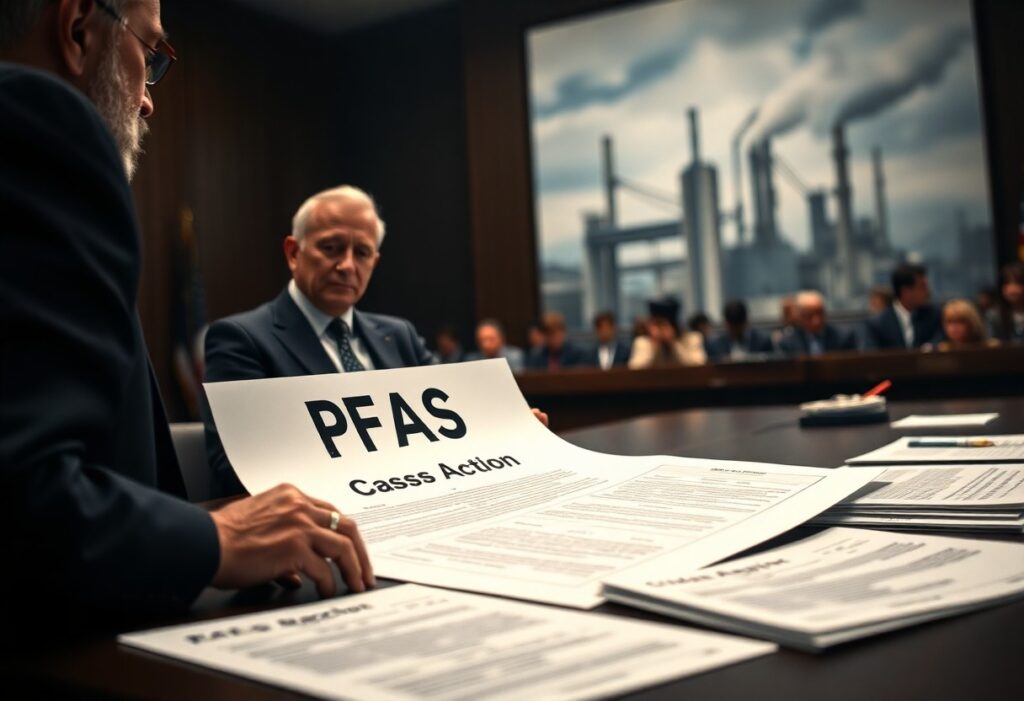Just as you rely on clean water for your health and wellbeing, expert attorneys are dedicated to ensuring that your right to safe water is protected. These legal professionals navigate complex environmental laws and advocate for communities facing contamination from pollutants. By representing victims of water-related injustices, they hold corporations accountable and seek meaningful compensation for affected individuals. This blog post will explore how these attorneys are pivotal in championing clean water initiatives and enhancing your understanding of the legal landscape surrounding water rights and environmental justice.
The Importance of Clean Water
To ensure a healthy and thriving community, access to clean water is fundamental. Clean water sustains life, supports ecosystems, and drives economic prosperity. Your well-being and that of future generations rely on safeguarding this precious resource. When water quality diminishes, it threatens not just human health but also the vitality of our environments, making it imperative that we advocate for policies and practices that protect our water sources.
Public Health Implications
Among the various concerns regarding water quality, public health stands out as a significant issue. Contaminated water can lead to a variety of health problems, including gastrointestinal illnesses, reproductive issues, and even neurological disorders. It is vital that you remain informed about the safety of your water supply to safeguard not only your health but also the health of your loved ones.
Environmental Impact
At the heart of the environmental consequences of polluted water lies the destruction of aquatic life and ecosystems. Water contamination can devastate fish populations, disrupt food chains, and diminish biodiversity, ultimately affecting the entire environmental balance. You play a critical role in advocating for clean water initiatives to protect the Earth’s delicate ecosystems.
In addition to harming aquatic ecosystems, polluted water sources can lead to long-lasting impacts on terrestrial environments as well. Contaminants can infiltrate soil, affecting agriculture and leading to the accumulation of toxins in plants, which can then enter your diet. Furthermore, habitats that rely on clean water become vulnerable, threatening the survival of numerous species. As you recognize the connections within our ecosystems, it’s important to support efforts that protect water quality, ensuring a healthier planet for all living organisms.
Legal Framework for Water Protection
Some legal frameworks exist to ensure your right to clean water. Understanding the laws and regulations that protect water resources is vital for advocacy. You can learn more about the intersection of environmental justice and water protection in the podcast Environmental Justice: Fighting for Fairness and a Safe ….
Federal Laws and Regulations
After the establishment of key federal laws like the Clean Water Act, you gain a framework for challenging pollution and protecting water sources. These laws facilitate environmental assessments, enforce standards for water quality, and hold violators accountable.
State and Local Ordinances
Federal laws serve as a baseline, but state and local ordinances significantly enhance water protection tailored to your community’s needs. They can impose stricter regulations, offer stronger protections, and provide additional avenues for enforcement.
Local governments play a vital role in water protection by enacting ordinances that address specific regional issues. These regulations can limit pollutants, establish conservation measures, and ensure access to safe drinking water. Your active participation in local governance can lead to positive changes that directly benefit your community by holding industries accountable and promoting sustainable practices.
The Role of Expert Attorneys
Clearly, expert attorneys play a significant role in the fight for clean water and justice. They leverage their extensive knowledge of environmental law to advocate for communities impacted by pollution and water contamination. These attorneys navigate complex regulations and policies, ensuring that your rights are protected and that your voice is amplified in matters concerning environmental justice.
Advocacy for Communities
One way expert attorneys facilitate meaningful change is through advocacy for communities. They work tirelessly to educate residents about their rights, empowering you to take action against entities that harm your local water sources. By collaborating with various stakeholders, these attorneys develop strategic initiatives aimed at restoring and protecting your community’s environmental health.
Litigation Strategies
Advocacy efforts are often complemented by effective litigation strategies that target violators of environmental laws. Attorneys utilize their expertise to formulate robust legal cases that challenge harmful practices and demand accountability. This process frequently involves gathering substantial evidence, connecting with scientific experts, and leveraging public sentiment to enhance your case’s impact.
Indeed, litigation strategies are important in the pursuit of clean water and justice. They allow you to hold polluters accountable by addressing violations of environmental regulations. Expert attorneys engage in extensive research, compile scientific data, and utilize expert testimonies to strengthen your case. Additionally, they may explore the potential for class action lawsuits, enabling you and your community members to come together and amplify your voices in the fight against water pollution. The combination of legal expertise and a deep commitment to environmental justice equips you with the tools you need to effect positive change.
Case Studies in Clean Water Advocacy
Once again, the significance of expert attorneys in clean water advocacy is highlighted through impactful case studies that showcase their dedication to justice. Some noteworthy examples include:
- Flint Water Crisis: Over 100,000 residents affected; $600 million settlement achieved.
- Standing Rock Pipeline Protests: Legal wins led to delays in the Dakota Access Pipeline construction.
- Shenandoah Valley Water Pollution: $2 million awarded to families affected by agricultural runoff.
Successful Legal Battles
To paint a clearer picture of the effectiveness of legal advocacy, consider that successful battles often lead to significant changes, such as stricter regulations and increased funding for clean water initiatives. These victories not only restore affected communities but also serve as important precedents for future cases.
Lessons Learned from Failed Attempts
Failed initiatives teach valuable lessons that are imperative for refining future strategies. The missteps observed highlight the need for thorough research, community engagement, and robust legal frameworks to protect water rights effectively.
But focusing on lessons learned from failed attempts can revolutionize your approach to advocacy. You might discover that inadequate evidence or a lack of community support directly impacts your cases. Additionally, understanding the political landscape and the importance of local voices can enhance your strategy. Each setback can clarify necessary adjustments, reinforcing your commitment to safeguarding the vital resource of clean water.
Collaboration with Environmental Organizations
Unlike many other fields, the fight for clean water benefits immensely from the collaboration between expert attorneys and environmental organizations. These partnerships enable legal professionals to tap into valuable resources, knowledge, and advocacy efforts that amplify the impact of their work. By joining forces, you can forge a stronger front against pollution and hold accountable those who threaten our water resources.
Building Strong Alliances
To create a meaningful impact, you must build strong alliances with reputable environmental organizations. These collaborations enhance your advocacy efforts and lend credibility to your legal strategies, allowing you to address complex water issues effectively and push for equitable solutions.
Engaging the Community
After establishing your alliances, engaging the community is crucial for fostering awareness and mobilizing support for clean water initiatives. Utilizing forums, workshops, and outreach programs, you can empower local residents to understand the importance of their role in environmental stewardship.
Building a community engagement strategy that prioritizes education and active participation can significantly enhance your efforts. When you inform citizens about the dangers of water pollution and the importance of conservation, they become motivated advocates for change. Encouraging community members to attend public hearings, participate in local environmental initiatives, and share their stories can create a powerful coalition for justice. Ultimately, your goal is to nurture a sense of ownership among community members, making them feel personally invested in protecting their water sources.
The Future of Clean Water Advocacy
After examining the current landscape of clean water advocacy, it becomes evident that the future holds both challenges and opportunities. You will likely see a greater emphasis on collaboration among various stakeholders, including governmental agencies, non-profits, and community groups, in the fight for sustainable water resources. This collective effort aims to ensure equitable access to clean water for everyone while addressing systemic inequalities.
Emerging Legal Trends
On the horizon, there are several emerging legal trends that will shape clean water advocacy. You may notice an increased focus on litigating against polluters and holding corporations accountable for their environmental impact. Moreover, innovative legal theories surrounding the public trust doctrine and community rights may gain traction, offering new avenues for your advocacy efforts.
The Impact of Climate Change
Trends in clean water advocacy are increasingly influenced by the impacts of climate change. You need to be aware that rising temperatures and unpredictable precipitation patterns can exacerbate water quality issues. These changes have the potential to lead to *severe water shortages* and *increased pollution*, particularly in vulnerable communities. The resulting *environmental injustices* demand a proactive response from you and your stakeholders to ensure long-term access to safe drinking water.
Emerging issues surrounding *climate change* continue to evolve, making it imperative for you to stay informed. The increasing frequency of extreme weather events can lead to *flooding*, which may overwhelm wastewater systems, contaminating water supplies. Additionally, *drought conditions* can strain existing resources, leaving marginalized communities disproportionately affected. Understanding these dynamics enables you to advocate *effectively* for policies aimed at not only preserving water quality but also ensuring resilience against the impacts of a changing climate.










